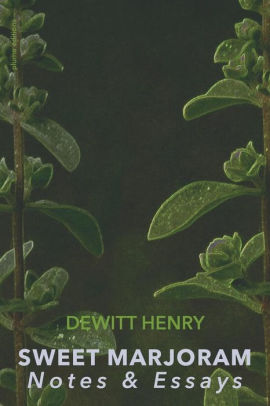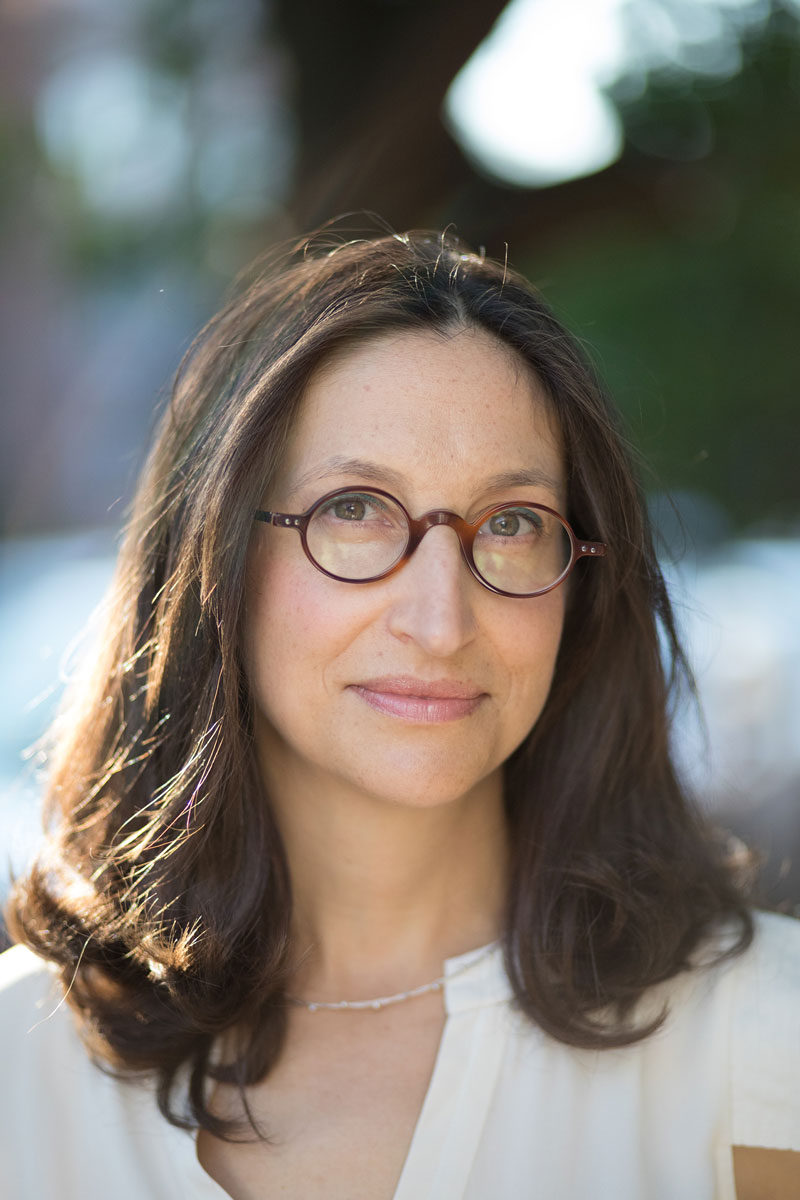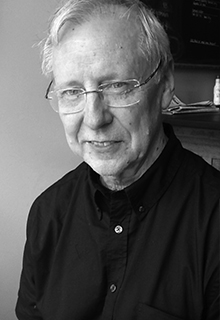 DEWITT HENRY’s “SWEET MARJORAM”
DEWITT HENRY’s “SWEET MARJORAM”
An interview with the author
by Jennifer Acker
JENNIFER ACKER: How did this essay collection develop? It’s remarkably unified in tone and in approach to the subjects, so I wondered if it was conceived as a whole, or written slowly over time without thought to a collection. Do you remember which essay came first?
DEWITT HENRY: After writing fiction and memoir, these meditations on abstractions have been a later life surprise. The first ones — On Conscience, On Weather, On Falling — were one-offs, in what seemed my natural, back-stage voice. Suddenly I wasn’t shy of speaking outright as a reader or thinker. Or of references to pop culture, film, folk wisdoms, and wired as well as print culture. The form was stream of consciousness. Editors and poet friends enjoyed them (Brevity, Mass. Review, Constellations). One friend, John Skoyles, thought they would make a book, which I doubted, but then each new topic utterly absorbed me, from the first intimations to deep research, to revisiting and pondering literary instances. I had discovered a form that I could apply, seemingly, to almost any topic.
JA: How did you choose the topics, especially something abstract like “dignity” or “falling”?
DH: Falling had been a motif throughout my work — I was aware of it as an image and psychological obsession (my collection of short fiction is called Falling: Six Stories). And from the fall from grace to physical falls, it was everywhere in literature, including Gloucester’s illusory fall in Lear. Catastrophe is our fate and the heart of tragedy. But we wish otherwise, hence my wife’s emendation of Rock a Bye Baby, an ending that astonished me. Other topics are from the “old saws” of classical thinking, which are debased or distorted by contemporary usage and practice: we need to revisit the best that has been thought and said about “dignity,” for instance, as we confront our media and political discourse since 2016, or our debates about the right to choose or assisted suicide.
JA: Essays are “attempts,” they are “thinking out loud.” Is there an essay you can point to that changed your mind about something — in which you ended up in a different place intellectually, with a different conclusion than you expected at the outset? Do you have a favorite essay in the collection?
DH: I think of these essays as expeditions. Each one ventures into facts and ideas I consider for the first time, as well as things I didn’t know I knew. I aspire to negative capability rather than “an anxious reaching for truth.” My endings are more a rehearsal of dialectics than conclusive; yet sometimes too, in Frost’s terms, I reach a small, personal clarification or stay against confusion. My favorite essay in the collection is “On Time,” where after reflecting on complex theories, studies, and even on dementia, I reach a felt truth: “Our numbered days. We can’t know how many we have, each of us, before time swallows all, including our thoughts about time.”
JA: Shakespeare references are liberally scattered throughout this collection, and I’d love to hear you talk about your experience reading and rereading him over the years. How has Shakespeare influenced your writing, how you view the world, your reading habits, etc.?
DH: I’ve taught alternating courses on the tragedies and comedies for three decades, without growing bored. The teaching has been to twenty-somethings at Emerson, where for most students (and their parents), engaging with Shakespeare stands for engaging with the idea of literature itself. I love to follow Shakespeare’s progress in craft and vision from the earlier to later plays; his “seeing deeper” into unpromising literary sources; his parallels and contrasts between genres, characters, and plots; his gender bending; his “cultural criticism.” And most of all his transformations of language through wit, metaphor, and iterative imagery. I’ve been inspired especially by his fools as authorial stand-ins, from Feste and his pulling words inside out like a cheveril glove to the many-faceted Falstaff and his reduction of words to mere air. To read Shakespeare, of course, is also to read about Shakespeare and to engage in and with conversations and perspectives about the plays across historical periods, global differences, and various theories of meaning. The plays are a crucible of liberal learning.
JA: Not only are you the founder of Ploughshares and its editor for many years, you have edited many anthologies over the years, as well as publishing your own writing. Which came first, editing or writing, in the development of your young literary self? And how have the two crafts interwoven and fed off of each other over the years?
DH: Writing, editing, and teaching are inter-connected for me. One feeds and energizes the other. I edited my first lit mag in college (where I also published installments of my creative thesis); and later set out with Ploughshares to create the taste by which to be appreciated — not just for the realist fiction I wrote, but for the “adventure of American letters,” as Gordon Lish once put it. I wrote slowly, publishing excerpts from my novel, along with reviews and criticism. But I was hired finally by Emerson College to teach full-time as the editor of Ploughshares, rather than as a novelist. For me editing, whether of special issues of the magazine (such as a “Special Realism Issue,” or “Confronting Racial Difference”), or of anthologies (such as “Breaking Into Print,” “Fathering Daughters,” or “Sorrow’s Company”), was personally urgent and expressive. And that was the kind of editing, too, that I prompted from other writers as they took their turns at our “revolving editorship.” We thought of literature as a kind of conversation, and I was comparing subjects, standards and visions with such writer/editors as Fanny Howe, Thomas Lux, Tim O’Brien, Frank Bidart, Margot Livesey, Jane Shore, James Alan McPherson, Gail Mazur, Sue Miller, James Carroll, Seamus Heaney, Joyce Peseroff, Raymond Carver, George Garrett, and many others as the network grew. Of course, not all writers are talented as editors; and some are vulnerable to colleagues and personal friends. Affinity is one thing; cronyism and self-promotion another.
JA: Also: what have you learned about writing from being an editor? Do you have a different relationship to editing now that you are not overseeing the regular output of a magazine?
DH: Editing others has taught me self-editing: to work for original response as distinct from echo or mannerism; to step towards truth, clarity, and economy; to kill darlings; to leave things out without losing them; to write through weaknesses to strength; and also, turning off my internal editor, to follow passion, and take risks. To trust the reader to work with me. To lead taste rather than follow it. To separate the heat of creation from the colder eye of revision. To care for the art rather than the artist. To honor intuition and play.
I’ve also learned from being edited, particularly by Debra Leigh Scott of Hidden River Press and Helene Atwan of Beacon Press.
JA: In passing we’ve discussed several other writer/editors. People like Richard Todd, who just passed away, and Ladette Randolph, current editor of Ploughshares. Is there a particular literary figure who looms larger than the others for you – who you sought to emulate, perhaps, or whose style you pushed back against?
DH: There are different kinds of editors: book editors, cultural magazine editors, and literary press and magazine editors.
One of the great models, Maxwell Perkins, wasn’t a writer himself, but his work with writers as diverse as Fitzgerald, Hemingway, Wolfe, Anderson and Dos Passos, helped to shape mid-20th century American literature. In the Fifties Edmund Wilson brought us Nabokov and Russian literature. In the late 1960’s, critic and memoirist Ted Solotaroff was the standout editor of the paperback revolution, both as founder of The American Review and a book editor (others might cite poet James Laughlin of New Directions). At Random House, Toni Morrison fostered a generation of black writers. .
The democracy of Ploughshares’s revolving editorship highlighted the many different directions of my writing generation and the notion that all editorial gate-keeping was a matter of opinion. Of course, some opinions were more persuasive than others. Literature was a debate of tastes. As different writers, we had our sometimes raucous disagreements, and the best issues stood as manifestos, both aesthetic and cultural.
Gordon Lish helped to endorse us. It is only since Ray Carver’s death that I’ve come to regard Lish as a negative model, an editor who treated Carver’s writing (and that of other writers) as raw material for his own “art.”
JA: To your mind, what is the difference between editing and teaching?
DH: The object of editing is to select, polish, and present work for publication to your magazine’s or press’s readers. It is a matter of gate-keeping and guarantee. This is worthy. This is tomorrow’s classic today. Attention must be paid.
The object of teaching is develop a writer’s talent and sophistication to the point that her or his work is ready to submit to editors for publication. Sometimes agents serve as a bridge. The traditional editor’s role of helping to develop talent has been ceded to MFA programs.
JA: Are there any particular editorial stories you can share that illustrate moments of insight or personal development, either as an editor or as a writer?
DH: Perhaps worth noting. There was a certain backlash once my novel was finished. Publishers viewed me as coming from the wrong side of the desk. My protege and successor at Ploughshares, Don Lee, was told exactly this by his editor at Norton about committing to a career as a novelist. You had to choose.
I write full-time now, but I have remained an advisor to Ploughshares since 2009, when novelist/memoirist Ladette Randolph took over as Don Lee’s successor.
I also volunteer as a contributing editor for both Solstice and Woven Tale Press magazines (both founded and edited by novelists, the former by Lee Hope and later by Sandra Tyler). Online publishing is a new frontier.
About the interviewer:
 Jennifer Acker is founder and editor in chief of The Common, and author of the debut novel The Limits of the World. Her short stories, essays, translations, and reviews have appeared in the Washington Post, Literary Hub, n+1, Guernica, The Yale Review, Off Assignment, and Ploughshares, among other places. Acker has an MFA from the Bennington Writing Seminars and teaches writing and editing at Amherst College, where she directs the Literary Publishing Internship and organizes LitFest. She lives in western Massachusetts with her husband.
Jennifer Acker is founder and editor in chief of The Common, and author of the debut novel The Limits of the World. Her short stories, essays, translations, and reviews have appeared in the Washington Post, Literary Hub, n+1, Guernica, The Yale Review, Off Assignment, and Ploughshares, among other places. Acker has an MFA from the Bennington Writing Seminars and teaches writing and editing at Amherst College, where she directs the Literary Publishing Internship and organizes LitFest. She lives in western Massachusetts with her husband.
Website: www.jenniferacker.com.
About the interviewee:
 DeWitt Henry was the founding editor of Ploughshares and has authored an award-winning novel, three memoirs, a story collection, and the new collection of lyrical essays, Sweet Marjoram, called “delightful and highly original” by novelist Margot Livesey. He is a Professor Emeritus at Emerson College, serves as Prose Editor of Woven Tale Press, and has published essays and reviews in the Boston Globe, Massachusetts Review, Kenyon Review, Solstice, LitMag, and elsewhere. Website: www.dewitthenry.com .
DeWitt Henry was the founding editor of Ploughshares and has authored an award-winning novel, three memoirs, a story collection, and the new collection of lyrical essays, Sweet Marjoram, called “delightful and highly original” by novelist Margot Livesey. He is a Professor Emeritus at Emerson College, serves as Prose Editor of Woven Tale Press, and has published essays and reviews in the Boston Globe, Massachusetts Review, Kenyon Review, Solstice, LitMag, and elsewhere. Website: www.dewitthenry.com .
The foregoing interview was conducted May 8, 2019.
Recent Comments